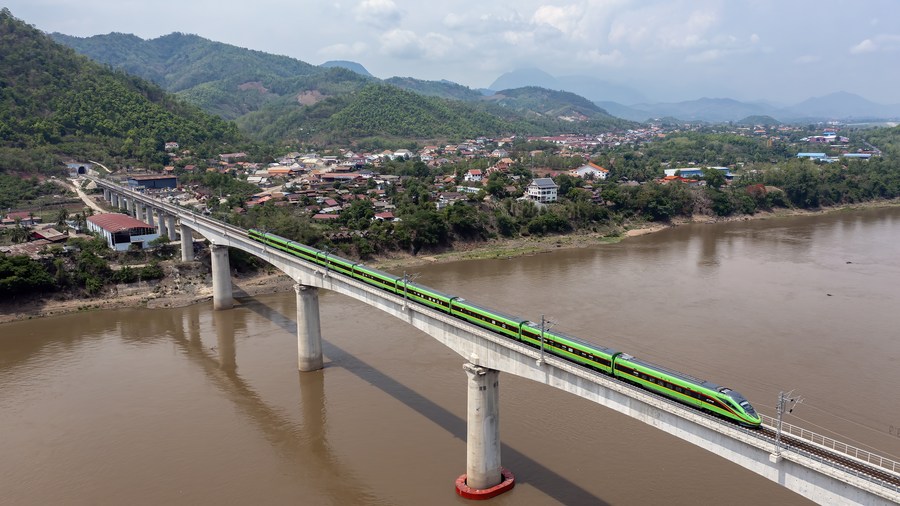(BRF2023) Interview: BRI enhances global trade threatened by geopolitical tensions, says scholar

A bullet train runs on the China-Laos Railway's Luang Prabang cross-Mekong River super major bridge in Laos, May 28, 2023. (Photo by Chen Chang/Xinhua)
Robert Lawrence Kuhn, chairman of the Kuhn Foundation, said science, technology and innovation would drive the future economy. Furthermore, the initiative's commitment to integrity-based collaboration would help eliminate corruption and other illegal or immoral activities when "large sums of money are allocated to large projects," he noted.
NEW YORK, Oct. 28 (Xinhua) -- A multidimensional connectivity network envisioned in the next stage development of the Belt and Road Initiative (BRI) enhances global trade threatened by fragmentation due to geopolitical tensions, a renowned U.S. scholar has said.
"Multidimensional connectivity, which is intrinsically win-win, will increase trade incentives, augmenting efficiencies and reducing costs, thus boosting globalization," Robert Lawrence Kuhn, chairman of the Kuhn Foundation, told Xinhua.
Expressing that multidimensional connectivity means linking various elements of connectivity, Kuhn said: "While each of the BRI pillars -- road, rail, ports, telecom, etc. -- is itself a 'connectivity' mechanism, the next stage will be linking them."
For example, using the Internet of Things to link rail and ports could make the delivery of goods "both wider in its market reach and more efficient in terms of time and money," Kuhn said.
Kuhn noted that "the emergence of sharp geopolitical alignments...is worrying, anti-globalization, anti-efficient, and does not augur well for anyone on planet Earth."
He noted Chinese President Xi Jinping's unambiguous directives for the next stage of the BRI center around China's vision of "high-quality development."
President Xi announced eight major steps China will take to support high-quality Belt and Road cooperation in his keynote speech on Oct. 18 at the third Belt and Road Forum for International Cooperation.
Kuhn said science, technology and innovation would drive the future economy. Furthermore, the initiative's commitment to integrity-based collaboration would help eliminate corruption and other illegal or immoral activities when "large sums of money are allocated to large projects," he noted.
"China's purpose is clear: To truly make the BRI the 'project of the century,'" Kuhn said.


